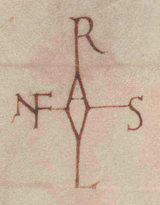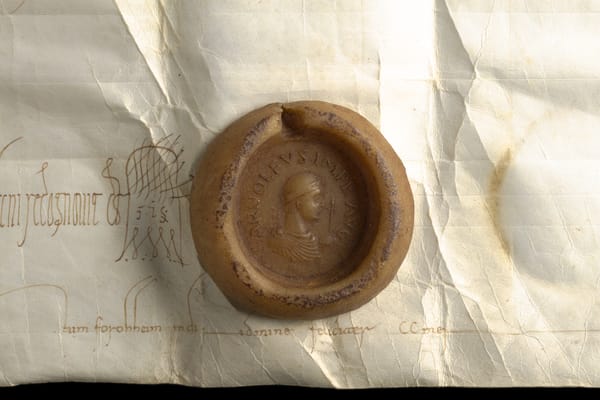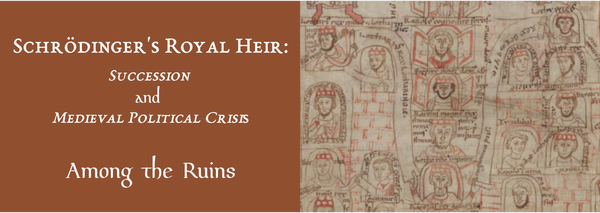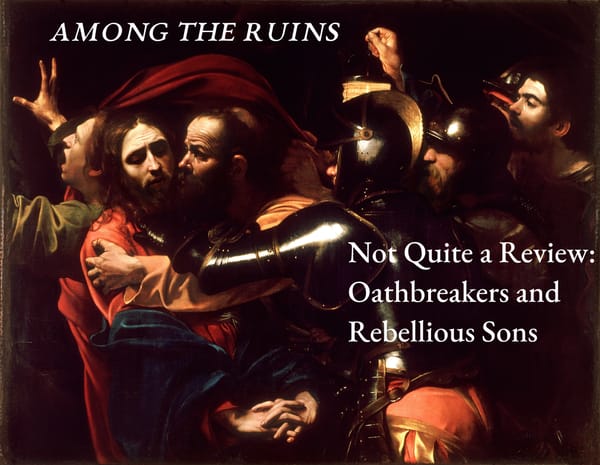An Early Medieval Murder Mystery
or, did Arnulf have his cousin killed?
If an early tenth century reader was to acquire a copy of Regino of Prüm’s Chronicon1 and looked up the entry for the year 882, they would find a somewhat curious, and brief, note about how someone named Louis “fell from the window of the palace and immediately died from a broken neck.”2 This was not just any random person, but the son of a king, confusingly also named Louis. As anyone who has ever played Crusader Kings knows, don’t let your kids anywhere near the palace railings.

At first glance it may appear an unfortunate accident, but there is perhaps a darker interpretation: that his cousin Arnulf had him killed. First, let me preface this by saying what follows is more historical imagination than an ironclad historical argument. But it does reveal some of the ways that historians work, and how in the absence of limited sources we can try to fit events together into what information we do know.
We need some context to not only understand who Arnulf was, but also how we could even attempt to make a guess as to the circumstances around the death of his cousin. Who is Arnulf? If you have heard of Arnulf before and are not a medieval historian (or someone who knows me in real life) then congratulations, I’m very impressed! For the rest of you, allow me to give you a very, very, brief introduction to the man I’ve spent almost a decade studying.
Born around 850, Arnulf was the son of the Carolingian king of Bavaria Carloman. The Carolingians were a dynasty that ruled the majority of western Europe between 751 and 887. Arnulf’s branch of the family ruled what is known as “East Francia” which geographically fits best with Germany and Austria, from 840 until 911. If you have heard of a Carolingian, it is almost always Charlemagne (although that is not who the dynasty is named after). Arnulf thus comes into the picture pretty late in the game, after there have already been several generations of Carolingian rulers before him. That 887 date is important, because that is when Arnulf overthrows his uncle Charles the Fat to become king. That coup is its own separate topic, but before becoming king Arnulf seems to have made a career for himself as a frontier commander in Bavaria and Carinthia.
It is here where the story really picks up. Sometime in the 870s Carloman had given Arnulf increased responsibilities along the frontier as way of safeguarding it while he invaded Italy. As many other rulers both before and after Carloman, the trip to Italy proved disastrous to the health of the king, and Carloman was essentially paralyzed and unable to speak. Instead of choosing Arnulf as his successor, he commended his kingdom to his brother, another Carolingian known to historians as Louis the Younger. Historians have often argued that Arnulf’s birth status as an illegitimate son or “bastard” disqualified him from succeeding his father as king of Bavaria and Italy.3 The reality is much more complicated, however. The sources seem to suggest that as Carloman’s health declined Arnulf in fact tried to make his own play for the throne.
Despite the assurance that the Bavarians would “not accept or consent to any other king to rule over them” a few months would pass before Louis received a count Erambert who protested that he and a few others had their public offices, known as honores, stripped by Arnulf and then exiled from the kingdom!4

Another source provides us a clue into what is actually happening here, noting that Carloman (who was still alive at this point but quite ill) was “surrounded at Ergolding by count Erambert and certain of his companions.”5 This sounds an awful lot like a coup to me, and that we then find Erambert complaining to Louis about his treatment by Arnulf suggests that he failed in capturing Carloman. Our first source is doing something tricky here then, in presenting Arnulf as expelling Erambert after the magnates had agreed to Louis’ kingship, the annal suggests that Arnulf was usurping a privilege that was not his: distributing and revoking honores was largely a royal prerogative. This source, which was partial to Louis the Younger, may be covering up that Louis had in effect staged a coup against the still-living Carloman! Evidently Arnulf held grudges, because almost twenty years later in 898 Erambert was captured and brought before the court “having been bound in chains.”6
This brings us back to the young Louis falling out of the window and breaking his neck. Arnulf, despite his apparent attempt to become king of Bavaria, was blocked by his more powerful uncle Louis (and his other uncle Charles). As part of what he must have hoped was a triumphant entry into Bavaria, Louis (now king) came to the Bavarian center of Regensburg. It was there that his son fell to his death from the palace window. Look, we don’t have any real proof that Arnulf had his cousin Louis killed. But there is plenty of evidence to suggest Arnulf’s support within Regensburg and Bavaria more generally. The only source that tells us about his death comes much later, about twenty-five years after the event itself. This suggests that at the time it happened, the pro-Louis sources may not have wanted to interrupt the narrative of triumph with the disastrous loss of his son. The following year Louis’ own illegitimate son Hugh would die in battle against the vikings, and the annalist has no issue telling us so. Perhaps then, it was the manner of the young Louis’ death that made contemporaries shy away from discussing it. Arnulf certainly would have benefited from the death of Louis’ son, and the increasingly restricted family tree of the Carolingians in the 880s went a long way to boosting Arnulf’s ability to become king. All we have is the overall context, including the suspicious timing of the death so soon after Louis essentially blocked Arnulf from becoming king. Arnulf would continue on as a frontier commander for eight more years after Louis’ takeover, and eventually would acquire the kingdom himself in 887. The rest of the 880s have their own craziness, so that will need to wait for another time. Hopefully you enjoyed this brief exercise in not only historical research, but historical imagination! Throw your email in the box below and get more writing like this delivered right to you, that’s right, just you.
This was a collection of entries organized year by year, that purported the tell the events of that year. I owe the suggestion that Arnulf may have had Louis killed to Eric Goldberg. ↩
Regino, Chronicon, s.a. 882, p. 119: idem puerulus de fenestra palacii cecidit et confractis cervicibus statim expiravit. ↩
This is its own topic that will probably be covered in another post! ↩
AF, s.a. 879, p. 92: optimates eiusdem regionis ad se venientes suscepit, ea videlicet ratione, ut post obitum Carlmanni nullum alium super se regem susciperent vel regnare consentirent. ↩
Annales Iuvavenses maximi, H. Bresslau (ed.), MGH SS 30, part 2 (Leipzig, 1934), p. 742: Karlmannus rex circumseptus ad Ergoltinga ab Ermenperto comite et ceteris sodalibus suis. ↩
AF, s.a. 898, p. 132: vinculis illigatus. ↩





